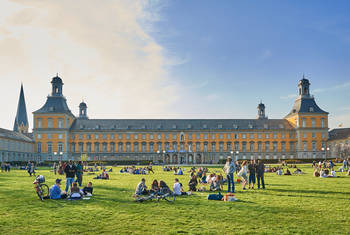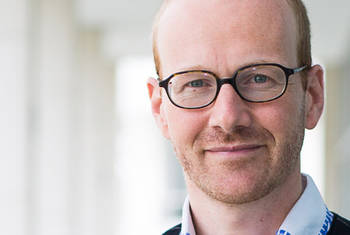Christian Zimpelmann How Do Households Invest Their Savings?
Christian Zimpelmann is a Research Associate at the Institute of Labor Economics (IZA). He completed his PhD at the University of Bonn is 2021 and has previously worked as a researcher at the Institute for Applied Microeconomics. Zimpelmann’s research focuses on household finance, family economics and labor economics. The recipient of a prestigious German National Academic Foundation Scholarship (2010-2015), Zimpelmann is a founder member of the CoVid-19 Impact Lab.
Area of Research
Economics
2019
Research Fellow
University of Bonn (Rheinische Friedrich-Wilhelms-Universität Bonn) (more details)
Institute for Applied Microeconomics (IAME)
2015
Lecturer
University of Bonn (Rheinische Friedrich-Wilhelms-Universität Bonn) (more details)
Stata Introductory Course
2013-2014
Student Assistant
Center for Development Research (ZEF)
2015-2021
Ph.D.
University of Bonn (Rheinische Friedrich-Wilhelms-Universität Bonn) (more details)
Bonn Graduate School of Economics
2015
Master of Science
University of Bonn (Rheinische Friedrich-Wilhelms-Universität Bonn) (more details)
Department of Economics
2014-2015
Exchange semesters
University of Toronto, Dept. of Economics
2013
Bachelor of Science
Karlsruhe Institute of Technology (Karlsruher Institut für Technologie)
Industrial Engineering
Fellowships
- German National Academic Foundation, Scholarship (2010–2015)
- Bonn Graduate School of Economics, Scholarship (2015–2018)
- Travel Grants by Bonn Graduate School of Economics, CRC TR 224, and DIW
 © University of Bonn
© University of Bonn

University of Bonn (Rheinische Friedrich-Wilhelms-Universität Bonn)
Bonn is one of the large universities in Germany, with around 36,000 students, 550 professors, 6,500 other staff staff. It offers a wide disciplinary spectrum comprising some 200 different degree programmes, from Agricultural Science to Tibetan Studies. This diversity is what characterizes Bonn as a full-range university with a strong international orientation. In many international university rankings Bonn is placed among the 100 best universities in the world.Its academic and research profile features internationally renowned specializations in the fields of Mathematics, Physics/Astronomy, Economics, Chemistry, Pharma Research, Biosciences, Genetic Medicine, Neurosciences and Philosophy/Ethics. Other disciplines, such as Geography and Law, are of outstanding importance within the German research scene.
The Rheinische Friedrich-Wilhelms-Universität Bonn is rooted in a long tradition going back almost 200 years. It was founded in 1818 by Friedrich-Wilhelm III, the Prussian king whose name it bears. Imbued with the spirit of Wilhelm von Humboldt, the university quickly joined the circle of Germany's most distinguished universities and became a major pole of attraction for leading scholars as well as students.The list of famous professors ranges from the astronomer Friedrich Wilhelm Argelander (1799-1875), through the chemist August Kekulé von Stradonitz (1829–1896) and political economist Josef Schumpeter (1883–1950) to the philologist Ernst Robert Curtius (1886–1956) and the theologists Karl Barth (1886–1968) and Joseph Ratzinger (born 1927), now Pope Benedict XVI. Bonn's best-known students include Heinrich Heine, Karl Marx, Friedrich Nietzsche, and Konrad Adenauer.
The university is proud of a long list of award-winning scientists and scholars, with about twenty Leibniz Prize winners and around thirty ERC grantees. In the last three decades two professors have received the Nobel Prize: Wolfgang Paul (for Physics, 1989) and Reinhard Selten (for Economics, 1994). (Source: University of Bonn)
Institute
The Collaborative Research Center (CRC) TR 224 – EPoS
The Collaborative Research Center (CRC) TR 224 – EPoS is a cooperation between the University of Bonn and the University of Mannheim. Funded by the German Research Foundation (DFG), it aims to analyze and provide policy proposals that address three key societal challenges: how to promote equality of opportunity; how to regulate markets in light of the internationalization and digitalization of economic activity; and how to safeguard the stability of the financial system.
Map
Different factors influence how households invest their savings. In this video, CHRISTIAN ZIMPELMANN explores the role that subjective beliefs about the stock market play in household investment decisions. Gathering data on stock holdings in the Netherlands from administrative data, Zimpelmann brings this into dialogue with Dutch households’ expectations about the stock market gleaned from surveys. Optimistic beliefs about stock market performance are shown to give rise to more risky investment decisions. Future research will explore the relevance of additional variables in such decisions as well as focusing on how beliefs affect other household choices relating to, for example, education and the labor market.
LT Video Publication DOI: https://doi.org/10.21036/LTPUB10903








